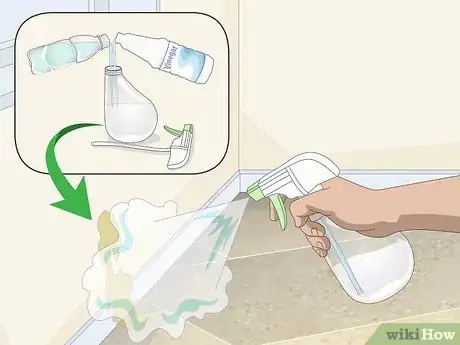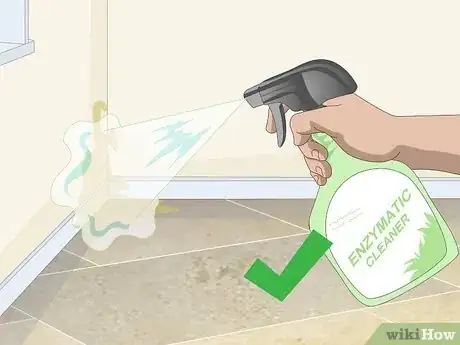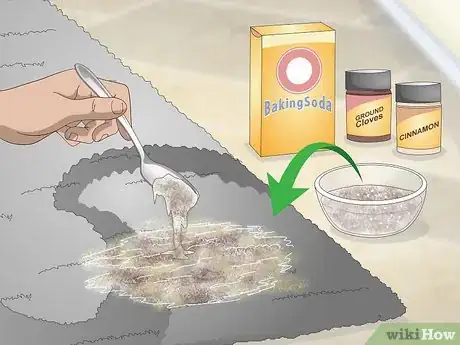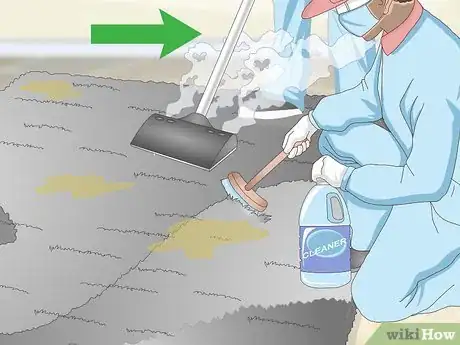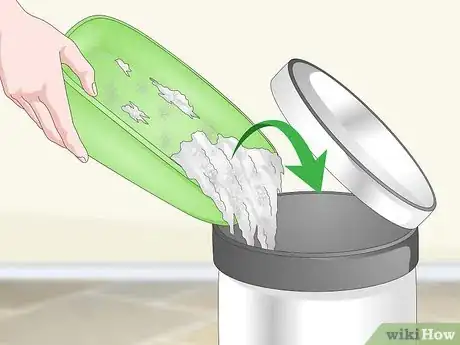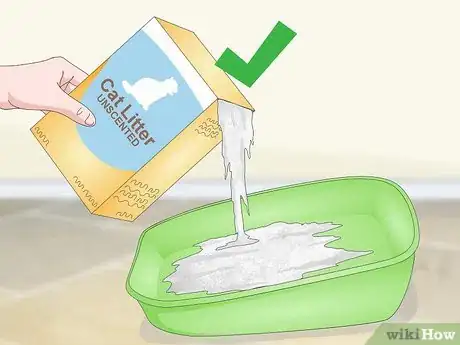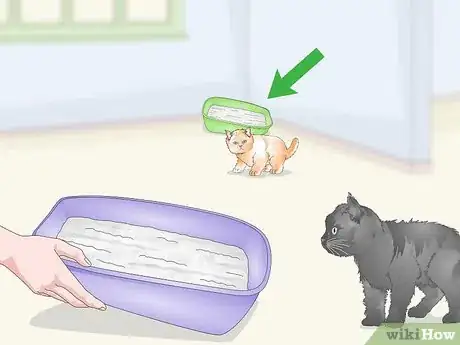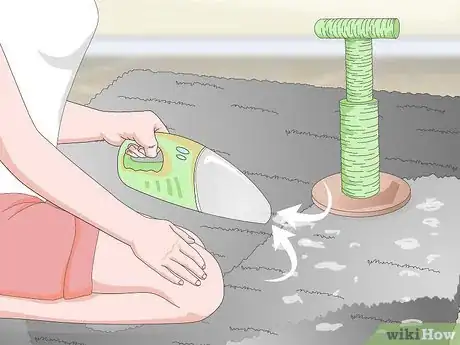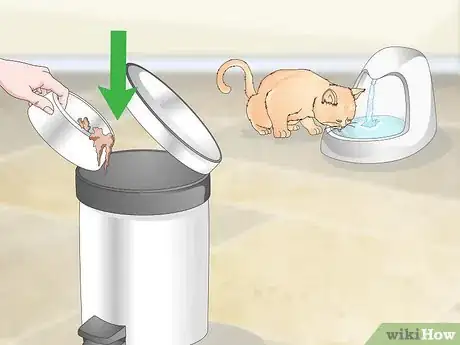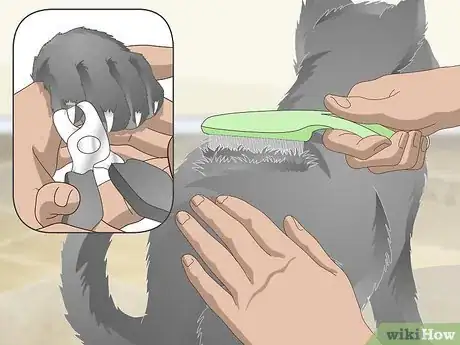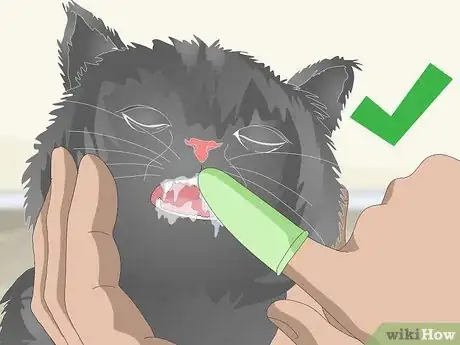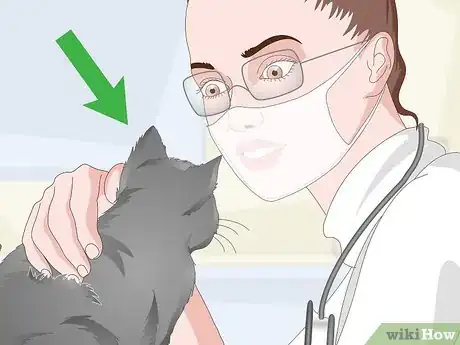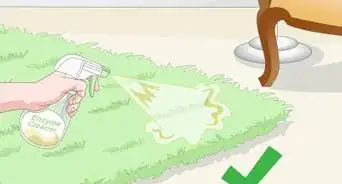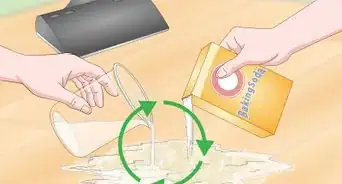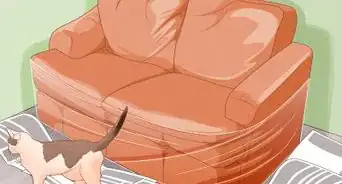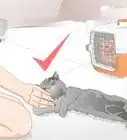This article was co-authored by Lauren Baker, DVM, PhD. Dr. Lauren Baker is a Veterinarian and Assistant Scientist at the University of Wisconsin-Madison. With over 10 years in veterinary medicine, she specializes in the concept of “one health,” which uses insights from veterinary medicine to help human medical research. She holds a Ph.D. in Comparative Biomedical Sciences, a Doctor of Veterinary Medicine, an MS in Comparative Biomedical Sciences, and a Bachelor’s degree in Psychology from the University of Wisconsin-Madison.
This article has been viewed 132,304 times.
Cat odors can build up in your home due to cat urine, cat feces, and cat dander. Though you love your feline friend, you may not want your house to smell day in and day out. To eliminate cat odors around your house, you can use cleaners, professional and all natural. You can also get rid of odors by keeping your cat’s litter box and other areas clean as well as by grooming and maintaining your cat.
Steps
Using Cleaners on Cat Odors
-
1Use a vinegar cleaner. There may be a strong urine smell in your home due to your cat’s litter box or due to your cat marking spots in your house. Tackle the urine odor by using a cleaner made of white vinegar. Put one part water and one part white vinegar in a spray bottle. Then, spray the cleaner on spots in your home that smell of urine. Let the vinegar evaporate, taking the urine smell with it.[1]
- For large areas that smell of urine in your home, you can apply a clean cloth soaked in the vinegar cleaner.
- For carpeted areas, you can use a carpet cleaner filled with the vinegar cleaner to remove urine odor. Just remember that low pH vinegars like distilled white vinegar can sometimes stain carpets. Always do a spot-test somewhere inconspicuous before using a new vinegar treatment.
-
2Try an enzymatic cleaner. An enzymatic cleaner contains enzymes that break down pet smells, such as urine odor. Breaking down these urinary components will also discourage your cat from marking these spots again. Look for enzymatic cleaners at your local pet store or online. Follow the instructions on the label to apply it to spots with pet odors in your home.[2]
- Do not use an enzymatic cleaner with other cleaning products. The ingredients in other cleaning products can weaken the potency of the enzymatic cleaner.
- Some enzymatic cleaners can damage wood fibers. If you need to clean hardwood floors or wooden furniture, make sure you get a special enzymatic cleaner that is meant for this purpose.
Advertisement -
3Apply an all natural air freshener. Another way you can remove cat odors is to use an all-natural air freshener made with baking soda. Combine 1 teaspoon baking soda with 1 teaspoon cinnamon, 1 teaspoon ground cloves, and 1 cup dried herbs like rosemary or lavender. Sprinkle the cleaner on your carpet or on furniture that has a smell. Let it sit for at least an hour and then vacuum it up.[3]
- Keep the air freshener on hand so you can sprinkle it on smelly spots in your home as needed. It is a great finishing touch after you have wiped up any cat urine or feces in your home as it will get rid of any lingering smells.
-
4Get your home professionally cleaned. If your house reeks of cat doors and regular cleaners are not working, get a professional cleaning done. Hire a professional carpet cleaner to address any cat related stains or smells on your carpets. Have a professional floor cleaner come in to get rid of smells on hardwood or tile. Most professional cleaners will be well versed in removing cat related odors in a home.
Keeping Your Cat’s Litter Box and Other Areas Clean
-
1Empty the litter box regularly. You can prevent cat odors in your home by maintaining your cat’s litter box. Try to check on the litter box once to twice a day. Scoop and remove any feces and urine clumps from the litter box as soon as possible so the smell doesn’t linger. Doing this will encourage your cat to use the box in the future and prevent your cat from going to the bathroom in other areas of your home.[4]
- Get into the habit of emptying the litter box first thing in the morning or at night before bed. This way, any feces or urine in the litter box will not sit in the litter for a long period of time.
- You should change the litter in the litter box twice a month to keep it fresh. Do a full wash of the box each time you change out the litter so it stays clean and odor-free.
-
2Use unscented litter. Scented litter will only mask the smell and make it hard for you to determine when the litter needs to be cleaned. Some cats can also be turned off by scented litter and decide not to use the litter box at all, leading to stinky spots in your house. Go for unscented litter that is light in color so you can see when there is feces in the box that needs to be removed.[5]
- To minimize odor in the box, you can sprinkle baking soda at the bottom and then put the litter on top. This can help to keep the litter smelling fresh.
-
3Have multiple litter boxes if you have more than one cat. Place the litter boxes in different areas of your home and clean each box regularly. Try to have at least one litter box per cat in your household so each cat has the space and privacy they need to go to the bathroom. Having multiple litter boxes will also ensure all the cats are not using one litter box. This can lead to a stinky litter box situation in your home.
- It is generally recommended that you have one litter box per cat plus one. That means that if you have 2 cats, you should aim for 3 litter boxes. If you have a multi-level home, try to have at least one litterbox on each floor.
-
4Vacuum your cat’s play area regularly. Use a vacuum made to clean pet hair and dander. Vacuum any areas where your cat plays or lounges, such as around cat trees or scratching posts. Make sure you also vacuum furniture where your cat likes to play, rest, or lounge. Try to vacuum these areas once a week so there is not a buildup of hair, dander, and cat odor.[6]
- Invest in a vacuum cleaner that is made to clean up pet hair, as this will make vacuuming your cat’s play area easier and quicker.
-
5Wash your cat’s bedding. Another source of odor may be your cat’s sleep area. Wash your cat’s bed regularly so odors do not linger. Put its bed and any blankets or pillows it uses in the washer. Get in the habit of washing your cat’s bedding once a week so it stays clean and odor-free.[7]
-
6Keep your cat’s eating area clean. To minimize odors in your home, maintain your cat’s eating bowl and drinking bowl. Clean its eating and drinking bowls once a day. Do not let wet food sit in its bowl overnight. Toss any dried food remaining in the bowl after a few days. This will keep your cat’s eating area clean, free of bacteria, and odor free.[8]
Grooming and Maintaining Your Cat
-
1Groom your cat regularly. Keeping your cat clean will help to keep odors out of your home. Get in the habit of grooming your cat on a regular basis. Brush their coats, trim their nails, and clean their ears. Doing this will keep germs and dirt from building up on your cat, which can then lead to odor.[9]
- Keep in mind your cat will self-groom on a regular basis, which is the best way for it to stay clean. Grooming your cat regularly will encourage your cat to self-groom on its own.
-
2Brush your cat’s teeth. Your cat may have bad breath due to a buildup of plaque and tartar in its cat’s mouth. Prevent this by brushing your cat’s teeth on a regular basis. Use toothpaste made for cats and a clean toothbrush.[10]
- If your cat’s breath does not smell better after regular brushing, bring it to the vet. It may have mouth related issues that need to be checked out and diagnosed.
-
3Take your cat to the vet if the odors do not go away. If you have tried cleaning your cat’s area and grooming your cat to no avail, bring your cat to the vet for a check up. Odors coming from your cat may be a sign of a medical issue.[11]
- You should also bring your cat to the vet if your cat keeps marking spots in your home or refuses to use the litter box. It may have a medical issue that needs to be addressed.
References
- ↑ http://lifehacker.com/use-vinegar-to-get-rid-of-old-stinky-pet-odors-1520292441
- ↑ https://www.petfinder.com/cats/living-with-your-cat/5-cat-urine-odor-removal-tips/
- ↑ https://www.petfinder.com/cats/living-with-your-cat/5-cat-urine-odor-removal-tips/
- ↑ http://www.vetstreet.com/dr-marty-becker/keep-your-home-pet-odor-free
- ↑ http://www.catster.com/cats-and-cleaning/eliminating-cat-odors-in-your-home
- ↑ http://www.vetstreet.com/dr-marty-becker/keep-your-home-pet-odor-free?page=2
- ↑ http://www.catster.com/cats-and-cleaning/eliminating-cat-odors-in-your-home
- ↑ http://www.catster.com/cats-and-cleaning/eliminating-cat-odors-in-your-home
- ↑ http://www.catster.com/cats-and-cleaning/eliminating-cat-odors-in-your-home
About This Article
To eliminate cat odors around the house, empty the litter box 1-2 times a day, and change the litter at least twice a month. Not only will this keep your home smelling fresher, but it will encourage the cat to continue to use the litter box. If your cat does go somewhere other than their box, use a cleaner made from vinegar or an enzyme-based cleaner on any cat urine stains. This will help break down the crystals that are the source of the odor. Keep reading for tips from our veterinary co-author on how to deal with bad breath on a cat!
